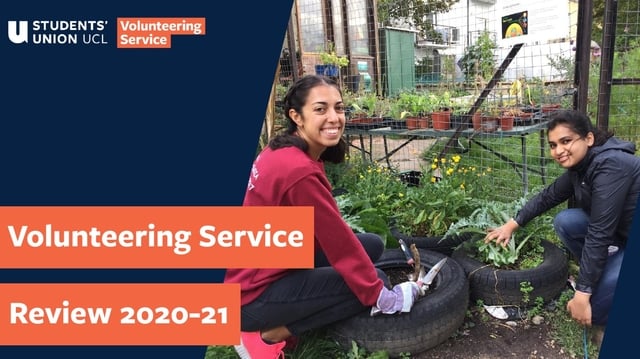Each year, we use surveys and other data collection techniques to measure our impacts and gauge the quality of our services. These are summarised in our Annual Review.
Volunteer Numbers
In 2020/21 we recruited and supported 1246 UCL student volunteers, who gave 40,250 hours of their time.
We also supported 378 master's students through the Community Research Initiative.

Impacts with our community partners
In our survey of community partners who had recruited UCL student volunteers during 2020-21, 98% felt that our students had made an impact. When we asked how, the most commonly cited impacts were improving people’s mental health and wellbeing, creating connections within a community, and improving access to arts, culture & heritage.
As usual, Camden was the borough where our students had the biggest impact – 45% of volunteering was with organisations based there. The next largest boroughs were Westminster and Islington with 8% and 6% of volunteers. The bulk of the volunteering we offered was with our existing partners and so matched geographical patterns from previous years, even where it had moved online. However, we did see a big growth in organisations outside of London – online volunteering offered new opportunities with new partners.

Impacts on students
We have a strong evidence base on the positive impact of volunteering on students’ skills development, academic life and their general well-being. In our 2021 student survey, we instead focussed on students’ sense of connectedness.
76% felt that through volunteering they were better connected with people outside of volunteering, and almost half felt better connected with other UCL students. Just over half felt better able to cope with lockdowns, and 84% agreed that they’d been a good representative of UCL.
95% of students felt they’d made a difference through their volunteering. When we asked how, the most common responses were through making connections within a community, improving other people’s mental health and wellbeing, with improving under 18's access to good quality education and access to digital services also being mentioned frequently.

Some long-standing trends remained despite the radical change in the nature of volunteering in 2020-21. Women and undergraduates continued to be more likely to volunteer, as were disabled students and UK students from Asian ethnic backgrounds.
However, there were some differences too. International students from outside the EU/EEA were less likely to engage – this was largely due to a big fall in the number of Chinese students volunteering. We don’t fully understand the reason for this fall, but it seems likely that it’s related to COVID.
There were some changes when looking at participation at faculty level – usually Laws, Life Sciences and Medical Sciences have highest participation rates. Whilst these were still all above average, Arts & Humanities showed the highest levels of volunteering.
Community Research Initiative for Students
The Community Research Initiative for Students (CRIS) exists to enhance the experience of UCL’s postgraduate (taught) students (PGT) by supporting them to undertake their dissertation in collaboration with a not-for-profit organisation. CRIS formally started on 11 November 2018 when the Community Research Manager took up her post. The rest of 2018/19 focussed on developing the programme infrastructure, establishing links with UCL departments and relevant community organisations, and engaging with a trial cohort of PGT students.
Find out more
If you'd like to know more about our surveys and reports, please feel free to get in touch.
